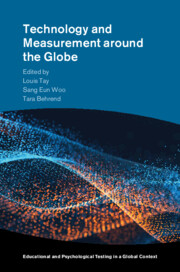Book contents
- Technology and Measurement around the Globe
- Educational and Psychological Testing in a Global Context
- Technology and Measurement around the Globe
- Copyright page
- Contents
- Contributors
- Introduction
- Part I Foundations
- Part II Global Perspectives on Key Methods/Topics
- Part III Regional Focus
- Chapter 7 Technology and Measurement in Asia
- Chapter 8 Technology-Enabled Measurement in Singapore
- Chapter 9 A European Perspective on Psychometric Measurement Technology
- Chapter 10 Testing and Measurement in North America with a Focus on Transformation
- Chapter 11 Technology and Measurement Challenges in Education and the Labor Market in South America
- Chapter 12 Reflections on Testing, Assessment, and the Future
- Index
- References
Chapter 12 - Reflections on Testing, Assessment, and the Future
from Part III - Regional Focus
Published online by Cambridge University Press: 08 November 2023
- Technology and Measurement around the Globe
- Educational and Psychological Testing in a Global Context
- Technology and Measurement around the Globe
- Copyright page
- Contents
- Contributors
- Introduction
- Part I Foundations
- Part II Global Perspectives on Key Methods/Topics
- Part III Regional Focus
- Chapter 7 Technology and Measurement in Asia
- Chapter 8 Technology-Enabled Measurement in Singapore
- Chapter 9 A European Perspective on Psychometric Measurement Technology
- Chapter 10 Testing and Measurement in North America with a Focus on Transformation
- Chapter 11 Technology and Measurement Challenges in Education and the Labor Market in South America
- Chapter 12 Reflections on Testing, Assessment, and the Future
- Index
- References
Summary
In this essay, we review the Technology and Measurement around the Globe chapters with an eye toward integration and synthesis. We primarily focus on implications for testing, and then make connections to the broader world of nontest assessment. We identify themes of privacy, fairness, workplace applications, and emerging technologies, and offer a research agenda for future investigations that seek to understand culture, technology, and measurement.
- Type
- Chapter
- Information
- Technology and Measurement around the Globe , pp. 349 - 359Publisher: Cambridge University PressPrint publication year: 2023



